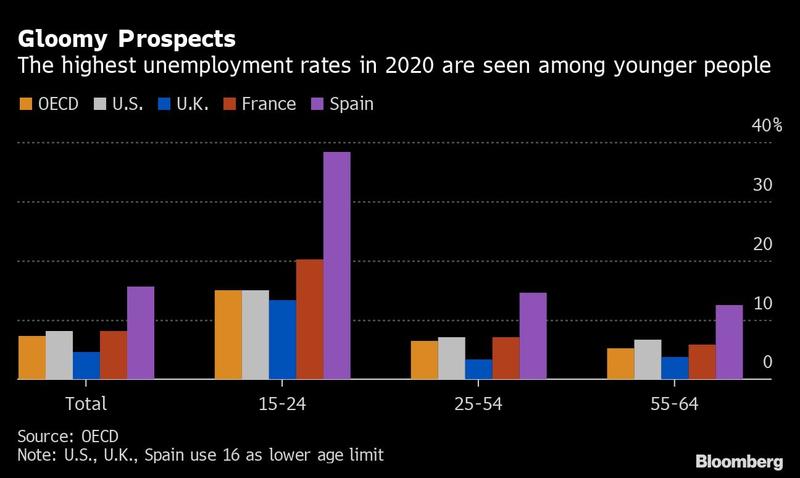 In this June 15, 2020 file photo, commuters wearing face masks walk through the concourse at Waterloo Station in London after new rules make wearing face coverings on public transport compulsory while the UK further eases its coronavirus lockdown. (NIKLAS HALLE'N / AFP)
In this June 15, 2020 file photo, commuters wearing face masks walk through the concourse at Waterloo Station in London after new rules make wearing face coverings on public transport compulsory while the UK further eases its coronavirus lockdown. (NIKLAS HALLE'N / AFP)
Labor markets in developed nations have recovered only half of the loss of employment they suffered in the pandemic, with the young and low-skilled hurt most.
That’s the conclusion of a 400-page study by the Organization for Economic Cooperation and Development, which found that about 22 million jobs disappeared by the end of 2020 in industrial nations. The Paris-based institution said a full recovery to pre-pandemic levels of employment won’t come until the end of next year.
The OECD said that about 114 million jobs were lost worldwide during the pandemic while there are still more than 8 million people unemployed than before the crisis
The findings indicate that the coronavirus crisis accelerated a number of trends that started over the past decade, including growing income inequality, a shift toward more technically demanding jobs and fewer secure employment opportunities for lower-skilled workers.
“Failing to address inequality and exclusion now is likely to result not only in deeper social divisions but will have negative ramifications for productivity and economic recovery,” said Stefano Scarpetta, the OECD’s director for employment, labor and social affairs.
ALSO READ: ILO chief says pandemic's impact on work 'cataclysmic'
The OECD found a “rapid buildup” of long-term unemployment, with each wave of pandemic restrictions making it increasingly difficult for people to find their way back into the workforce.
“There could be a growing mismatch between the skills and competence of the workers who have lost their jobs, and actually the skills which are in demand in the jobs which are being created,” said Scarpetta at a press conference.

Those in hospitality and service-sector jobs forced to close for months suffered greater levels of joblessness and lower levels of training than those with professional jobs that could be done from home. Employment grew in sectors such as finance and insurance even at the height of the pandemic, while lower-paying occupations had a reduction of more than 28 percent in hours worked.
It warned about a “particularly worrisome” increase in inactivity among young people in most countries and called for governments to boost training to re-skill workers.
“Ultimately we need to get into the situation where the economy is able to adjust, where we are able to identify those businesses that have a genuinely viable and growing future,” said Secretary-General of the OECD Mathias Cormann.
The OECD said that about 114 million jobs were lost worldwide during the pandemic while there are still more than 8 million people unemployed than before the crisis, and at least 14 million more people classed as inactive in the labor market in the OECD area.
READ MORE: ILO: Global economy will still be 23 million jobs short next year
The growth of teleworking in the longer term could exacerbate inequalities in working conditions. The OECD suggested training, investment and regulation to expand technical skills among lower-paid occupations.
Time spent on leisure in OECD countries has also decreased since the mid-1990s in most countries, with data suggesting that increased productivity has not led to extra leisure time.


